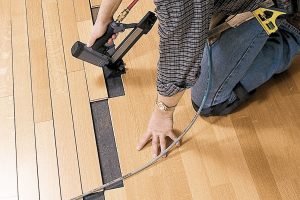
Hardwood flooring is a timeless and versatile option that has been a top choice among homeowners for generations. Whether you’re building a new home or renovating an existing one, selecting the right hardwood floors can significantly enhance the aesthetic appeal and value of your property. However, with the myriad of options available in the market, the decision-making process can be overwhelming.
In this comprehensive guide, we’ll delve into the intricacies of hardwood flooring, exploring the different types, species, finishes, and installation considerations to help you make an informed decision that aligns with your preferences and budget. By the end of this article, you’ll have a thorough understanding of the key factors to consider when choosing the perfect hardwood floors for your home.
Understanding the Types of Hardwood Flooring
When it comes to hardwood flooring, there are two primary types to choose from: solid hardwood and engineered hardwood.
Solid Hardwood Flooring
Solid hardwood flooring is made from a single, solid piece of wood, typically ranging from 3/4 to 5/16 inches in thickness. These floors are known for their exceptional durability and the ability to be sanded and refinished multiple times, allowing them to last for decades. Solid hardwood is a popular choice for new home construction and can be installed directly over a wooden subfloor.
Engineered Hardwood Flooring
Engineered hardwood flooring is composed of multiple layers, with a top veneer of real wood and a core made of plywood or other composite materials. This construction makes engineered hardwood more dimensionally stable and less susceptible to expansion and contraction caused by changes in humidity and temperature. Engineered hardwood can be installed over a wider range of subfloors, including concrete, and is often a preferred choice for basements and other below-grade areas.
Exploring Wood Species
The type of wood species you choose for your hardwood floors can have a significant impact on the overall aesthetic and performance of your flooring. Here are some of the most popular wood species to consider:
Oak
Oak is one of the most popular and widely available hardwood species. It is known for its distinctive grain patterns, durability, and the ability to take a wide range of stains. Both red oak and white oak are excellent choices for high-traffic areas.
Maple
Maple is a hard and dense wood that is prized for its light, uniform color and subtle grain. It is a popular choice for modern and contemporary design styles, as well as in high-traffic areas like kitchens and living rooms.
Cherry
Cherry wood is renowned for its rich, reddish-brown hue that deepens and matures over time. It is a moderately hard wood that is often used in traditional and classic design schemes.
Walnut
Walnut is a luxurious and sought-after wood species that offers a deep, warm brown color and distinctive grain patterns. It is a softer wood compared to oak and maple, making it more susceptible to dents and scratches.
Exotic Woods
Hardwood enthusiasts may also consider exotic wood species, such as Brazilian cherry, Brazilian walnut (also known as Ipe), and tigerwood. These woods often boast unique and striking visual characteristics, but they can be more expensive and may require specialized installation and maintenance.
Hardwood Flooring Patterns and Grain
The way the wood is cut can also have a significant impact on the appearance of your hardwood floors. Here are the three main types of wood grain patterns to consider:
Plainsawn
Plainsawn, or flatsawn, wood is the most common and economical option. It features a classic, cathedral-like grain pattern that is widely appealing and versatile.
Quartersawn
Quartersawn wood is cut perpendicular to the growth rings, resulting in a more linear and uniform grain pattern. This method is often more expensive, but it can produce a distinctive and visually striking appearance.
Riftsawn
Riftsawn wood is cut at a 45-degree angle to the growth rings, creating a straight, linear grain pattern with minimal visible growth rings. This option is the most expensive but can offer a unique and contemporary look.
Hardwood Flooring Finishes
The finish you choose for your hardwood floors can significantly impact the overall appearance and maintenance requirements. Here are the two main types of finishes to consider:
Prefinished
Prefinished hardwood floors come with the stain and protective coating already applied at the factory. This option offers a consistent and durable finish, and the installation process is generally faster and easier. However, the color and sheen options may be more limited compared to site-finished floors.
Site-Finished
Site-finished hardwood floors are sanded and finished on-site after installation. This approach allows for greater customization, as you can choose the exact stain color and sheen level that best complements your home’s design. However, the installation process is more involved, and the floors will need to be protected during the curing period.
Hardwood Flooring Widths
Hardwood flooring planks come in a range of widths, each with its own aesthetic and practical considerations:
Narrow Planks (2-3 inches)
Narrow planks create a traditional, classic look and are generally more budget-friendly. They are also less prone to gapping and warping over time.
Wide Planks (6-8 inches)
Wide planks offer a more modern and luxurious appearance, with fewer seams and a more seamless visual flow. However, they are more susceptible to movement and may require more careful installation and maintenance.
Mixed Widths
Combining different plank widths can create a unique and visually interesting floor pattern, blending traditional and contemporary elements.
Hardwood Flooring Costs
The cost of hardwood flooring can vary widely, depending on factors such as wood species, finish, and installation method. On average, you can expect to pay:
- Solid Hardwood: $6 to $12 per square foot, including installation
- Engineered Hardwood: $4.50 to $16 per square foot, including installation
It’s important to factor in the cost of professional installation, as this can significantly impact the overall project budget. Additionally, the cost of materials may be higher for exotic wood species or custom finishes.
Hardwood Flooring Installation Considerations
Proper installation is crucial for the long-term performance and beauty of your hardwood floors. There are several installation methods to consider, depending on the type of flooring and the subfloor:
Nail-Down
Nail-down installation is the traditional method for solid hardwood floors, where the planks are secured directly to a wooden subfloor using nails or staples.
Glue-Down
Glue-down installation is often used for engineered hardwood floors, where the planks are adhered to the subfloor using a specialized adhesive.
Floating
Floating installation, where the planks are not secured directly to the subfloor but rather “float” on top of it, is another option for engineered hardwood and some solid hardwood floors.
It’s essential to consult with a professional installer to determine the best installation method for your specific project and ensure a successful and long-lasting result.
Hardwood Flooring Maintenance and Care
Maintaining the beauty and longevity of your hardwood floors requires regular cleaning and care. Here are some essential tips:
- Sweep or vacuum regularly to remove dirt and debris that can scratch the surface.
- Use a damp mop or hardwood floor cleaner to clean the floors, avoiding excessive moisture.
- Protect high-traffic areas with area rugs or runners.
- Trim pet nails regularly to prevent scratches.
- Avoid dragging heavy furniture or appliances across the floors.
- Refinish the floors every 7-10 years to restore their luster and protection.
By following these maintenance guidelines, you can ensure that your hardwood floors remain in excellent condition for years to come.
The Benefits of Hardwood Flooring
Hardwood flooring offers a wealth of benefits that make it a popular choice among homeowners:
- Timeless Aesthetic: Hardwood floors are a classic and elegant choice that can complement a wide range of design styles, from traditional to modern.
- Increased Home Value: Homes with hardwood floors tend to have higher resale values, making them a smart investment.
- Durability: With proper care and maintenance, hardwood floors can last for decades, if not a lifetime.
- Easy Maintenance: Hardwood floors are relatively easy to clean and maintain, requiring only regular sweeping, mopping, and occasional refinishing.
- Allergy-Friendly: Unlike carpets, hardwood floors do not harbor dust, pet dander, or other allergens, making them a great choice for those with allergies.
- Versatility: Hardwood floors can be installed in almost any room in the home, except for areas with high moisture levels, such as bathrooms and laundry rooms.
Choosing the Right Hardwood Floors for Your Home
When selecting hardwood floors for your home, consider the following factors to ensure a perfect fit:
- Room Usage: Evaluate the intended use of the space and choose a wood species and finish that can withstand the expected level of foot traffic and potential exposure to moisture.
- Aesthetic Preferences: Determine your personal style and design preferences, and select the wood species, grain pattern, and finish that best complement your home’s overall aesthetic.
- Budget: Establish a realistic budget that accounts for the cost of materials, installation, and any necessary subfloor preparation.
- Installation Expertise: Decide whether to hire a professional installer or tackle the project as a DIY endeavor, based on your skill level and the complexity of the installation.
By carefully considering these factors, you can confidently choose the perfect hardwood flooring for your home, ensuring a beautiful and long-lasting addition to your living space.
The Design Emporium Can Help You With Flooring Design and Installation Services
When it comes to flooring design and installation, attention to detail is paramount. The choice of flooring material, whether hardwood, laminate, tile, or carpet, sets the tone for the entire space.
> Learn More
Hardwood flooring is a timeless and versatile choice that can transform the look and feel of your home. By understanding the different types of hardwood, exploring the various wood species and finishes, and considering the practical installation and maintenance requirements, you can make an informed decision that aligns with your preferences and budget.
Contact us (859-283-5352) for a free consultation!
—
 About The Design Emporium
About The Design Emporium
The Design Emporium is your destination for all your home improvement needs. From cabinets to countertops, and from hardwood flooring to carpet, we offer a wide range of high-quality products to beautify your home. Our selection includes quartz countertops, various types of flooring such as hardwood, laminate, vinyl plank, and carpet, as well as a variety of tile options. Whether you’re renovating your kitchen, bathroom, or any other living space, we have the products to bring your vision to life. With our commitment to quality and customer satisfaction, we are your trusted partner for all your home renovation projects.
> Learn More
